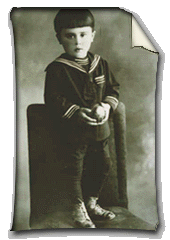 "There, that's me", my father stops and always
points out on the same old photograph, whenever we look at the pictures
of the family album. There, on the yellowish family photograph taken, God
knows how long ago, but more than half a century for sure, somewhere on
a family picnic gathering - stands he, a child with black, round curious
eyes, dressed in short pants with trousers, long leggings, and attached
next to my grandmother. "This is my
brother, this is my other brother…and this is Aunt Rachel", used to say
my father, always repeating the very same sentence, whenever we looked
at that family photograph.
"There, that's me", my father stops and always
points out on the same old photograph, whenever we look at the pictures
of the family album. There, on the yellowish family photograph taken, God
knows how long ago, but more than half a century for sure, somewhere on
a family picnic gathering - stands he, a child with black, round curious
eyes, dressed in short pants with trousers, long leggings, and attached
next to my grandmother. "This is my
brother, this is my other brother…and this is Aunt Rachel", used to say
my father, always repeating the very same sentence, whenever we looked
at that family photograph.
I saw Aunt Rachel for the first time on that old photograph with worn out
edges. The same photograph that my father had shown me an infinite number
of times, the photograph we still keep in the family album. Sitting behind
the elderly serious images of my grandmother and my grandfather, that girl
with the soft round face looks at you with an odd, withdrawn and modest,
yet clear and persistent gaze.
I have to admit, I still love old photographs. When I was little,
I loved them because they were linked to a lot of stories told by the elderly
relatives who came to visit our home. They would usually retell them after
dinner, over a cigarette and the smell of the freshly brewed coffee that
my mother took out on the old silver plate. And then, after one of the
relatives would ask for the family album, their chats became filled with
memories of some other time and some other people. Quietly I listened to
the endless conversations of the personalities from the family album that
I always failed to understand completely. Those characters were called
upon in the room filled with smoke, usually through the joyful, merry tones
and the vivid narrative shouts. Occasionally, they were mentioned in the
unhearing murmuring comments, but also in the smothered giggle, or disturbed
by the sudden loud laughter of the guests. Sometimes I would catch them
floating in the living room, during the narrators' interludes - the ruling
silences, and the speeches made in shattered voice. Stories. Stories of
people's destinies, and biographies of distant relatives that I had never
heard of. The stories were intertwined with characters from the novel of
the past, archived and then reenacted in the amazing theater of life by
the characters that have entered in the little photographic family everlastingness.

Now that I enter midlife I start loving photographs
in another way as well. Like preserved prints of the shapes of past, not
just of the set and costume design of times gone with the wind, of the
changed topography and geography of space, but - least deceiving - of the
landscapes of the human world, of the faces, expressions, relations, weaknesses,
emotions, moods, souls… 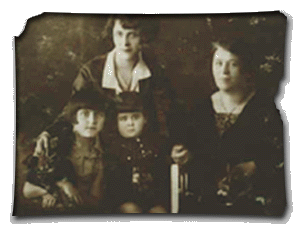 Captured
in a moment, for eternity. Thus, fitted for contemplation. And of constant
come back. In the characters of a time. Of an age. The mystique of the
photographs of my childhood which came to life in the atmosphere condensed
by the cigarette smoke and the past called upon in the family gatherings
that I tried to rationalize later. The photographs, as I defined later
when I comprehended the first philosophical terms, are an expression of
the paradoxes and even more, of the aporia which have always existed and
exist even today, getting new appearances so that the wonders of technology
of modern life are being added as new arguments to the unchanged phenomenon
of the being. Consequently the ascetic arsenal of those paradoxes, noted
in the ancient Eleic teachings and determined in the scholastic examples
of Achilles and the Turtle or the Bow and the Arrow, can be enriched today
with a new technological example…the photographs, yes the photographs.
There are static, and yet they contain a process, they are tranquil, and
yet they poses disquiet, they are numb, and yet carry so many stories.
They show but they hide so much too. They are the new kind of the pure
aporian substrate. They depict the multi-significant, captured past brought
until today. That is why it just looks as if they bring serenity and order
in the distressed, chaotic movement of life. Sometimes they even instigate
that in us. The pictures, the photo-fixations, the icons, the photo-engravings. Captured
in a moment, for eternity. Thus, fitted for contemplation. And of constant
come back. In the characters of a time. Of an age. The mystique of the
photographs of my childhood which came to life in the atmosphere condensed
by the cigarette smoke and the past called upon in the family gatherings
that I tried to rationalize later. The photographs, as I defined later
when I comprehended the first philosophical terms, are an expression of
the paradoxes and even more, of the aporia which have always existed and
exist even today, getting new appearances so that the wonders of technology
of modern life are being added as new arguments to the unchanged phenomenon
of the being. Consequently the ascetic arsenal of those paradoxes, noted
in the ancient Eleic teachings and determined in the scholastic examples
of Achilles and the Turtle or the Bow and the Arrow, can be enriched today
with a new technological example…the photographs, yes the photographs.
There are static, and yet they contain a process, they are tranquil, and
yet they poses disquiet, they are numb, and yet carry so many stories.
They show but they hide so much too. They are the new kind of the pure
aporian substrate. They depict the multi-significant, captured past brought
until today. That is why it just looks as if they bring serenity and order
in the distressed, chaotic movement of life. Sometimes they even instigate
that in us. The pictures, the photo-fixations, the icons, the photo-engravings.
Like the photograph of the modest yet persistent gaze on Aunt Rachel's
face.
"All right", I asked my father not so long ago "Are you going to tell me
something about her? Who is Aunt Rachel? Why does she appear on that one
photograph?…"
"Who is Aunt Rachel? 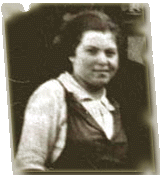
How can
I explain…She is one of us. She was not a relative, and yet she felt so
close…
And what
is a relative? One with whom you were born, with whom a coincidence or
family tied you with. Or one to whom life itself has bound you. Life has
tied Rachel with us. She was my mother's favorite. As time passed by, she
became a daughter to her.
Rachel was a child from
a poor family, which my mother Euridika, may her soul rest in heaven, took
to our home to help. She was the eldest child in her father's large family
in order to work and earn. Her father vas a modest man, a shoe-sewer that
barely fed his family. Today that is a rare profession, but once there
were more shoe-sewers than shoe-stores. He was a big man with a round face,
and sad eyes which in time I believe became sadder. Although different
Rachel and her father had something in common in their gaze. Some kind
of serenity and deep sadness.
Whenever Rachel would take me by the hand and bring me into his small,
clean but old and weary shoe-sewer store, we would sit on the two left
shabby chairs and then I would watch her and her father look at each other
silently for a long time. He would always ask us if we wanted ginger ale
or lemonade and after Rachel would look at me straight in the eyes refusing
for both of us, he would put his big hand on her head and pet her along
the thick, shiny hair. He would gently slide his hand on his daughter's
cheek, smiling softly, and would keep looking in the sad reflection of
her deep, intelligent eyes. Than he would put his arm to rest, and with
a nod he'd show her that it was time to go.
In time, Rachel started sleeping over at our house, but every day she
would take time to visit her home, see her family and fetch them something.
It didn't matter if it was a share of her monthly pay, of some food, prepared
in our kitchen for a holiday or some special occasion. Rachel would go
home and come back sooner than anyone of us would have expected.
"Why did you rush, there's no more work to do", often said my mother,
while Rachel would smile and disappear somewhere in the house to proof
the opposite. 
Rachel quickly grew closer to our family. She learned the habits, even
the weaknesses of all the family members, and she would always act in the
best interest of the family. She quietly reproach my eldest brother when
he started coming home late and when she found a pack of cigarettes in
his pocket stolen from my father's store. She took care of me, since I
was the youngest of all, and helped my mother when I was both, sick and
healthy. She taught my middle brother mathematics and covered him whenever
he would do an unintentional mischief, but also helped my father with the
bookkeeping and the tax forms.
Rachel simply became a part of us. Quiet and delicate she helped everyone,
mostly my mother. She became so close to us, that after a while, she started
speaking the language of the family. She, a bright Jewish girl from Bitola,
started speaking Vlach so well that people could not recognize that she
was not a Vlach herself. That is how Rachel grew to our home.
Because of her seriousness and honesty, my mother gave her full confidence.
That brought a new closeness between them. When Rachel started growing
into a woman, my mother started giving her advice that no one could hear.
As my mother didn't make any difference between her and us, Rachel grew
very close to her. At that time, I would catch my mother's glimpse over
the hardworking girl, while Rachel did one of the countless household tasks.
One night, using her strong and determined voice, my mother asked my father
to start giving Rachel a fixed amount of money for her dowry:

"I don't have a daughter,
and that's why it's easier for me", my mother used to say to Rachel who,
on the other hand, listened to her with eyes-wide-open. Rachel never missed
the chance to laugh whole-heartedly with the rest of us, every time we
would hear Euridika's comment, usually said whenever she added a new sum
of money for Rachel's dowry:
"So, we completed
the easy part. Now we need a groom", my mother would say while we continued
joking and Rachel pretended as if she didn't hear anything, exiting the
room with a slight blush on her face.
During the time when my father's face became more
worried as he listened to the radio that he had bought for the sake and
great joy of my two elder brothers - Rachel fell in love. At least my mother
said so, gazing at the shy and sensible girl. The person chosen by her
heart was Jon, a strong and healthy young man with red cheeks and a pretty
smile. He was the son of the milkman who came every night, wearing his
beanie, bringing fresh milk to our house. In all the years that he was
coming Jon was always with him.
No one knew exactly when Jon and Rachel fell in love. We only knew that
it had happened, by the blush on Rachel's cheeks every time she would leave
the porch and enter the living room with a can of fresh milk in her hands.
And so, we started joking around whenever we would see Rachel combing
her shiny dark hair in the mirror, before Jon came in the evening. My mother
usually froze our frowning faces with a single, quick glimpse, and then
we rushed out of the room silencing our giggles with our palms leaving
the girl carried away in her ritual accompanied by my mother who, pretending
as if she didn't notice, carefully watched over the first signs of Rachel's
adolescence in its prime.
During that time, in the quietness of the snowy winter nights, Rachel
wove blue shapes on the pieces of her dowry, under the vigil eye of my
mother who taught the girl new and complicated embroideries while she was
patching our socks and underwear. She spoke quietly to Rachel of the secrets
and traps of marriage and life.  On
occasion, we the kids would capture some of those advises whenever we would
enter the kitchen for a glass of milk before bed, pretending not to listen,
while the two of them carried away in my mother's narrating, would continue
the ritual of revealing the experiences of life. On
occasion, we the kids would capture some of those advises whenever we would
enter the kitchen for a glass of milk before bed, pretending not to listen,
while the two of them carried away in my mother's narrating, would continue
the ritual of revealing the experiences of life.
On the
other hand, my father turned into a silhouette, sat by the radio next door
in the neighboring dark and cold room, wearing a robe and a scarf and leaning
his ear to the glowing device, cautiously turning the volume down whenever
Rachel would enter. He stayed there until my mother called him to be reasonable
and come in to the warm kitchen. I think that is how my father grew old.
Those months were engraved in my memory as if they were years. I can still
remember my father - a stooped silhouette in the dark room - leaning over
the radio and listening to its whisper.
One day, and that was at the beginning of the occupation
when the new, Bulgarian authorities came and sealed our radio, Rachel started
noticing our mocking glimpses after the milkman's visits. Jon waited outside
while she, completely confused, entered the house to find the milk can.
It was then that Rachel caught my elderly brothers winking at each other.
But so did my mother too. Entering the kitchen at that moment and handing
over the milk can to Rachel, she bitterly scolded them and sent them off
to their rooms. I gave her a scared look, and after she noticed that, she
came, smiled and gave me a long hug. That was how Rachel found us, coming
back from the porch. She didn't have the softness and the careless appearance
anymore - she was pale. That was the first time I noticed a peculiar, persistent
gaze in her sad eyes. They were focused on my mother. My mother whispered
in my ear to go to bed.
"What has happened?" My mother asked Rachel
"Jon wants us to leave," silently answered Rachel.
But they didn't. Life went on as usual. Only, Rachel's face got a new,
solemn expression that changed briefly, after Jon's visits. My mother allowed
her to take him into the kitchen, explaining to my father that she did
so because of the threat from the occupation police. Meanwhile she told
my father, who drank tea even more, and stopped listening to the radio,
that she saw an overwhelming emptiness in Rachel's eyes. Jon, continued
coming over, while strange changes took place in our town.
One day, coming back from her parents' house Rachel brought a yellow
star. She took it out and put it on the table.
"My father said that from now on, we are to put this on, every time
we are on the street." My mother, always quick in her reactions, came to
the table and took the star.
"What are these nonsense child, here's where you'll put it," my mother
opened the trash-can, and threw out the yellow star. We all felt eased
by that gesture. Everyone smiled. My eldest brother mockingly imitated
Mussolini. Until the evening everyone was in good spirit.

Apart from our wishes, things became more
tensed. Soon enough, over the offices and stores, some of them belonging
to our family friends, the sign "Forbidden for Jews, Vlachs and dogs" appeared.
The Jews and the Serbs where banned from the schools. My father started
closing the store earlier, trying to stay home longer. Whenever a uniformed
person entered the store, he got confused, partly because he couldn't speak
Bulgarian, and so my eldest brother had to leave school, and take over
the business. Apart from him, my mother started unwillingly changing her
Macedonian language into Serbian instead of Bulgarian, whenever she dealt
with the Bulgarian government services, which gave me the erroneous impression
that she did that to purposely agitate the occupiers.
The people with yellow stars became more and more visible in town. They
were our neighbors, our friends, customers in my father's store. My father
stopped going to the store. And being the quiescent person that he usually
was, he became almost completely silent. My mother tried to cheer him up,
while my brother ran the business. Whenever my father looked down, my mother
would come and rest her arm on his head. Then, he usually looked up and
gave her a trifling smile.
"Is there anyone in the store?" He always asked my mother, and after
she confirmed, he bowed his head and had a sip of the tea, now, almost
always in front of him.
One day the inspection from the Direction of Jewish questions came to
our house to check for Jews. My father was numb. When the inspector asked
him the question, I believe that he couldn't even hear it. Rachel looked
at my mother.
"There is no Jews here", said my mother, in a cold voice. Then she turned
towards Rachel, and spoke to her in Vlach: "And what are you waiting for.
Go and finish your work, and take your father out of the room too."
Rachel understood and turned towards my father, she took him by the
hand and he stood up.
"Excuse me now gentlemen, I have work to do," my father told the inspectors
in a shattered voice and walked out of the room taking Rachel with him.
My mother turned toward the unwanted visitors.
"Anything else gentlemen?" She asked them with a determined voice.
"Nothing!" They said, and noted that on Solunska Street, number 10,
there are Unbefitting, but no Jews.
As of those days, the last reminiscences of peace
and serenity were lost. The winter was harsh, and filled with another kind
of coldness, the one within the people, that slowly took over our town.
Rumors that the Jews are going to be taken away by the Bulgarian police
became more frequent. Those rumors said that they would be taken to special
gathering centers, where they will be detained until the end of the war.
Many said that those centers were a point of no return.
Since the rumors began, Rachel started sleeping over at her parents'
house again. One late afternoon, right after she left our house, her father
came in to our home. He came in, wearing his large black hat and worn-out
coat. The corpulent man stopped by the living-room door, and nodded, after
he quickly glanced at everyone with his big, sad eyes. My mother invited
him to sit down and offered him some jam, but he interrupted her.
"Dear madam, sit down please, I have to tell you something of great
importance," He said with a feeling of decisiveness reflected in his eyes.
"Rumors say that we Jews are going to be taken away on a road of which
no one knows anything."
"That's nonsense, people talk all kinds of rubbish nowadays."
"It is possible," Rachel's father answered after a longer pause. "But
in case it is the truth, then I have come here to ask you to keep Rachel
with you. She told me that you listed her as a family member, may God lay
his blessing upon you. If we have to go, I would like at least one of my
children to stay. You accepted my daughter as if she were one of yours.
"
My mother looked at the man's deep, sad eyes. There, he saw something
that left her numb and speechless. She just nodded.
As of that night Rachel started sleeping over in our home again.
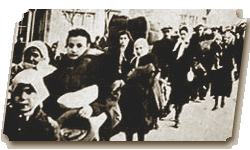
In the morning of March 11, the raids really
started. The town was filled with soldiers and policemen. As we heard later,
they arrested the Jews, and led them through town in vast lines.
I was sick those days and slept in my parents' bedroom. A silent clamor
woke me up from the restless sleep. I turned toward the window. My mother
was awake. She stood by the shut window blinds, wearing her nightgown and
a scarf over her shoulders, watching a river of people pass by. Faces known
and unknown. She was gazing at the children sleeping in their parents'
arms and the old people who were trying catch up with the fast - moving
line. In the bed, right next to me, laid my father. He stared at the ceiling
with a blank, expressionless look on his face.
That day, my brother didn't go to the store. My father woke up and woke
everyone up - everyone but Rachel. We gathered in the kitchen. Everybody
was quiet. My mother told my father to go and ask around the neighbors
if anyone minded the fact that we kept Rachel.
"Whoever has anything against us keeping Rachel will most certainly
turn us into the police. If there is even one neighbor who does mind, we'll
tell everyone she's gone, and hide her here, in the house."
My father had a pensive look on his face. He had just left the house
through the kitchen door, to start his visits with the neighbors, when
Rachel appeared at the kitchen door.
She was neatly dressed. She wore her new coat and winter shoes. She
had a suitcase in her hands. My mother had a terrified look on her face.
"Where do you think you are going?" my mother asked her in a firm voice.
"I have to go," replied Rachel, and smiled at us with her sad persistent
gaze, which reminded me so much of her father's. Everyone was silent and
could not say a word.
"Wherever my people go I will go too," she added silently.
"You shan't go anywhere!" Said my mother. "That is your father's wish
too. You will wait for them here."
"If they come back, I will come back with them. You see how things stand,
mother." She said, looking at me, "It is best that everyone is with their
own.
"My mother bowed her head. Then she looked straight into Rachel's eyes.
"You don't consider us your own?" she murmured.
"Don't make it harder on me, mother," said Rachel and a tear drop sled
down her round, soft cheek. "This is how it has to be. Otherwise there
will be no peace for any of us.
"She turned around and gave my mother a hug. They stayed silent for
a while.
My mother whispered something in her ear. She refuted quickly and shook
her head - then she turned away from my mother. She glanced at us with
a strange, deep look. I got the feeling that she wanted to capture everything
with her sight: my mother, us, the kitchen, the wooden ceiling, the stove,
the window, the door through which my father left, and through which she
would come in blushed and filled with joy after Jon's visits. She wanted
to smile at us, but the tears gave her out. Then she turned around and
left.
That was the last time I saw Aunt Rachel.
That night Jon came to our house. My parents had invited him for the
first time to the reception room. My mother gave him the embroideries of
Rachel's dowry. She showed them to him peace by peace, just like the custom
required.
"Keep them, keep them well", she told him before the young man left
speechless and confused.
 That was Rachel. She wasn't a relative,and yet she
felt s
That was Rachel. She wasn't a relative,and yet she
felt s
o close. And what is a relative? One with whom you were born, with
whom coincidence or family tied you to. Or one to whom life itself has
bound you. Maybe, most of all, it is someone you miss. Even from your ancestor's
photographs. The ones you have never met. The ones you had just seen. On
a photograph. The ones you felt close to. Through the stories that repeat
long afterwards. Looking through your family albums. With the photographs,
the photo-fixations, the icons, the photo-engravings. Capturing the moment
of that glaring net, thrown in the turbulent seas of time.
There, just like on the family photograph with Aunt Rachel, everyone is
gazing at you. And although they are all gone, everyone is still here,
together, now… 
(Translated by:
Dimitar T.Osmanli)
|
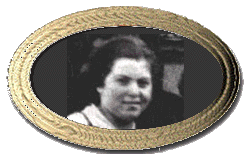

 "There, that's me", my father stops and always
points out on the same old photograph, whenever we look at the pictures
of the family album. There, on the yellowish family photograph taken, God
knows how long ago, but more than half a century for sure, somewhere on
a family picnic gathering - stands he, a child with black, round curious
eyes, dressed in short pants with trousers, long leggings, and attached
next to my grandmother. "This is my
brother, this is my other brother…and this is Aunt Rachel", used to say
my father, always repeating the very same sentence, whenever we looked
at that family photograph.
"There, that's me", my father stops and always
points out on the same old photograph, whenever we look at the pictures
of the family album. There, on the yellowish family photograph taken, God
knows how long ago, but more than half a century for sure, somewhere on
a family picnic gathering - stands he, a child with black, round curious
eyes, dressed in short pants with trousers, long leggings, and attached
next to my grandmother. "This is my
brother, this is my other brother…and this is Aunt Rachel", used to say
my father, always repeating the very same sentence, whenever we looked
at that family photograph.
